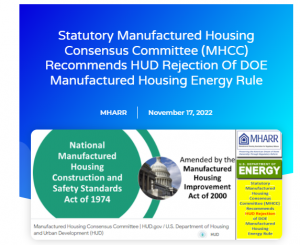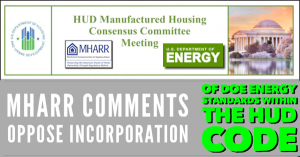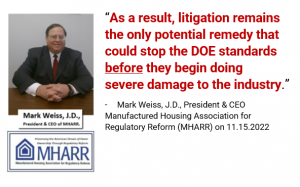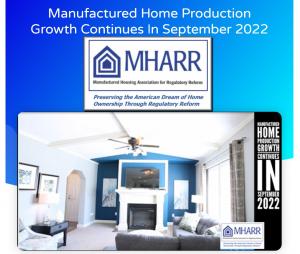Statutory Manufactured Housing Consensus Committee (MHCC) to HUD-Reject DOE Manufactured Housing Energy Rule, Reg Update

Statutory Manufactured Housing Consensus Committee (MHCC) recommends HUD Rejection of DOE Manufactured Housing Energy Rule. MHARR logo.

Manufactured Housing Association for Regulatory Reform (MHARR) Comments Oppose Incorporation of DOE Energy Standards Within the HUD Code.

“As a result, litigation remains the only potential remedy that could stop the DOE standards before they begin doing severe damage to the industry.” - Mark Weiss, J.D., President & CEO Manufactured Housing Association for Regulatory Reform (MHARR) on 1
The Manufactured Housing Consensus Committee (MHCC) voted to reject inclusion in the HUD Code the Department of Energy (DOE) manufactured housing energy rule.
NOVEMBER 17, 2022
TO: MHARR MANUFACTURERS
MHARR STATE AFFILIATES
MHARR TECHNICAL REVIEW GROUP (TRG)
FROM: MHARR
RE: MHCC RECOMMENDS REJECTION OF DOE ENERGY RULE
The statutory Manufactured Housing Consensus Committee (MHCC), at the conclusion of its November 15-17, 2022 meeting in Washington, D.C., to further consider the “alignment” of the HUD Code Federal Manufactured Housing Construction and Safety Standards (FMHCSS) with the U.S. Department of Energy (DOE) final energy conservation standards for manufactured housing adopted on May 31, 2022, has approved multiple recommendations for submission to HUD. The most significant of these recommendations are consistent with and reflect actions that MHARR urged the Committee to take in written comments filed on November 9, 2022. (See, Attachment to MHARR Memorandum dated November 14, 2022 -- “MHARR Comments Oppose Incorporation of DOE Energy Standards Within the HUD Code”). They also reflect MHCC consideration of – and agreement with – additional specific points raised by MHARR as a participant in the October and November 2022 MHCC in-person meetings.
MHARR, in its November 9, 2022 comments, urged the MHCC to:
· “Reject the incorporation of the DOE May 31, 2022 final manufactured housing standard within the FMHCSS;”
· “Adopt a statement rejecting the May 31, 2022 final DOE manufactured housing energy standard as being inappropriate for and destructive of the affordability of manufactured housing;” and
· “Assert that HUD adoption of any modified or altered DOE manufactured housing energy standard must be based on a full and valid analysis of all applicable costs … as well as compliance with all applicable procedural requirements of federal law.”
Consistent with these key substantive and procedural points – which could directly impact any industry legal action against the DOE final standards – the MHCC took final action to reject the wholesale incorporation of the DOE final rule into the FMHCSS standards as proffered in advance by HUD. Instead, it approved, among other things, comments to HUD stating, in relevant part:
· “The MHCC has reviewed the DOE Final Rule and has determined [that] DOE circumvented the standards development process prescribed in [the Energy Independence and Security Act of 2007] EISA which requires cost justification and consultation with HUD;”
· “DOE provided an energy conservation standard which was based on site-built construction and applied it to a performance-based national code. If adopted as written, the final rule would adversely impact the entire Manufactured Housing program and cost increases associated with compliance would reduce prospective purchasers (especially minorities and low-income consumers) from durable, safe, high quality and affordable housing;” ***
· “The MHCC previously recommended that DOE include the substantial cost of testing, enforcement, and regulatory compliance in its costing analysis. The final rule did not consider these costs….”
· “The MHCC has a statutory obligation to consider the cost impacts of all recommended changes to the MHCSS and preserve affordability to increase American home ownership and this obligation is reflected in the recommended changes.”
· “The MHCC expects, in accordance with normal practice, the recommendations contained in this document will be subject, as required in 42 USC 5403, to publication as a proposed rule and full notice and comment rulemaking in accordance with the 1974 Act as amended.”
(Emphasis added). In substance, each of these points align with the statements and positions sought by MHARR in its written comments.
In addition to these “general” conclusions and recommendations with respect to the DOE May 31, 2022 final standard, the MHCC also considered and recommended to HUD, proposed “incremental” revisions to the FMHCC energy standards developed by the Manufactured Housing Institute (MHI). Whether these proposals are – or will ultimately be – acceptable to MHARR as proposed modifications to the FMHCSS standards, will depend upon member input and further cost-benefit and practicability analysis conducted by the Association as part of the HUD rulemaking process, as that process moves forward.
For present purposes, however, the recommendations adopted by the MHCC accomplish several important MHARR goals. First, rejection of the DOE final rule, if accepted by HUD, will prevent the enforcement of that rule, as currently drafted, through the HUD Part 3282 enforcement system for FMHCSS standards, with no alternative DOE enforcement system in place. Second, rejection of the DOE standard by the MHCC can be offered as evidence of DOE’s failure to comply with EISA on both substantive and procedural grounds in any industry legal action to stop the DOE rule. Third, notice and comment procedures for any variant of the DOE rule will, in all likelihood, extend beyond the May 31, 2023 scheduled implementation date for the DOE final standard, meaning that enforcement of the DOE standard may ultimately be delayed, leaving more time to seek remedies to stop the DOE standard.
With these recommendations submitted, it will now be up to HUD to fully comply with its governing federal law to ensure that manufactured housing consumers and especially lower-income families, are not adversely impacted by DOE’s energy standard.
Finally, with all of these pieces in place, the industry is in a good position to initiate timely legal action against DOE to seek an injunction against the imposition of its final May 31, 2022 manufactured housing energy standards.
MHARR will continue to actively participate in the HUD/MHCC process while aggressively opposing the egregious and baseless DOE manufactured housing energy standards.
cc: Other Interested HUD Code Manufactured Housing Industry Members
Manufactured Housing Association for Regulatory Reform (MHARR)
1331 Pennsylvania Ave N.W., Suite 512
Washington D.C. 20004
Phone: 202/783-4087
Fax: 202/783-4075
Email: MHARR@MHARRPUBLICATIONS.COM
Website: manufacturedhousingassociation.org
MHARR's detailed comments are attached at this link here.
About the Manufactured Housing Association for Regulatory Reform (MHARR)
MHARR is Protecting the American Dream of Home Ownership. We Bring Consumers, Industry Professionals, Public Officials and Media Common-Sense Solutions Others May Miss.
MHARR News
https://manufacturedhousingassociationregulatoryreform.org/mharr-news/
MHARR Monthly Manufactured Home Shipment Data
https://manufacturedhousingassociationregulatoryreform.org/category/manufactured-home-shipments/
MHARR's Objectives
https://manufacturedhousingassociationregulatoryreform.org/brief-history-and-objectives-of-the-manufactured-housing-association-for-regulatory-reform-mharr/
From the above: The Manufactured Housing Association for Regulatory Reform (MHARR) was established on July 3, 1985 as the “Association for Regulatory Reform” (ARR). The Association changed to its current name in the summer of 1997.
Based in Washington D.C. since its founding, MHARR was formed to represent the views and interests of producers of manufactured housing. A major source of the nation’s supply of non-subsidized affordable homes, the manufactured housing industry is federally regulated by the U.S. Department of Housing and Urban Development (HUD) — the only segment of the housing industry to be regulated at the federal level. MHARR is dedicated to maintaining a regulatory framework which promotes both the availability and affordability of manufactured housing — an objective now enshrined in federal law thanks to the Manufactured Housing Improvement Act of 2000, which MHARR successfully sought, promoted and advanced to enactment. Its primary and enduring mission is to protect, defend and advance the interests of its members and the manufactured housing lifestyle for American consumers of affordable housing.
Since MHARR’s establishment, the production of manufactured housing has become increasingly competitive and complex. As the industry has matured, numerous state and federal agencies have sought to impose rules and regulations that could significantly impact its cost and availability as a prime non-subsidized housing resource for Americans at every rung of the financial ladder.
Within the industry, the voice of manufacturers — the segment of the industry most directly affected by federal regulation — has tended to be merged with that of other segments of the industry, including retailers, suppliers, finance companies and community developers. Each such segment has its own specific interests and perspective, but unless manufacturers’ views can be articulated, published and advocated independently, the representation of those views is unavoidably weakened by being merged into an “umbrella” representation, which necessarily must be the lowest common denominator among various diverse segments of the industry.
The industry has also witnessed the emergence of a new type of manufacturer with large retailer and financing affiliates. That segment of the industry may also have different needs than smaller and medium-sized independent manufactures. Consequently, the primary objective of the Manufactured Housing Association for Regulatory Reform is to enunciate the consensus view of manufacturers, so that their experience, understanding and approach will be considered in the formulation of any law, rule standard or regulation that is imposed on the industry.
Necessarily, though, the interests of manufacturers – and consumers – are unavoidably impacted by activity and developments affecting the post-production sector of the industry (i.e., activity and developments affecting manufactured homes and consumers once such homes leave the factory). Such activity – by government or quasi-governmental actors – can negatively impact both the utilization and availability of manufactured homes for large segments of the public and can significantly constrain that availability, to the extreme detriment of all concerned. Current examples of this phenomenon include the failure of the Government Sponsored Enterprises (GSEs) to provide securitization and secondary market support for manufactured home loans in accordance with existing law and discriminatory and exclusionary zoning and placement restrictions on manufactured homes in many more densely-populated areas of the United States. Because of this indisputable reality and the fact that the long-term absence of any type of independent, dedicated national representation for the industry’s post-production sector has allowed such problems to multiply and fester, MHARR has taken (and will continue to take) the lead on these matters as well.
Ultimately, though, it is axiomatic that there is no regulation without economic cost — particularly for a federally regulated industry. That cost, inevitably, will be passed on to the purchaser. Overall, therefore, MHARR seeks an improved environment for the growth of the industry and for the availability of affordable manufactured housing to American consumers through fair, reasonable and cost-effective federal regulation. Furthermore, the Association is dedicated to reassessing all existing regulations periodically to determine their cost, merit and relevance, and to measuring each new law and regulation against the same criteria, with the principal objective of protecting manufactured housing consumers while simultaneously ensuring the continuing availability of safe, affordable, non-subsidized manufactured homes.
MHARR Issues and Perspectives
https://manufacturedhousingassociationregulatoryreform.org/category/mharr-issues-and-perspectives/
Recent MHARR headlines
https://manufacturedhousingassociationregulatoryreform.org/manufactured-housing-consensus-committee-mhcc-debates-doe-energy-standards/
https://manufacturedhousingassociationregulatoryreform.org/manufactured-housing-association-for-regulatory-reform-mharr-provides-october-2022-meeting-insights-with-senior-hud-officials/
https://manufacturedhousingassociationregulatoryreform.org/washington-d-c-updates-on-manufactured-housing-issues-including-doe-energy-assault-hud-moving-on-doe-standards-mh-financing-mh-white-paper-and-more/
Manufactured Home Production Growth Continues in September 2022
November 4, 2022
https://manufacturedhousingassociationregulatoryreform.org/manufactured-home-production-growth-continues-in-september-2022/
Manufactured Housing Consensus Committee (MHCC) Debates DOE Energy Standards
October 24, 2022
https://manufacturedhousingassociationregulatoryreform.org/manufactured-housing-consensus-committee-mhcc-debates-doe-energy-standards/
Manufactured Housing Association for Regulatory Reform (MHARR) Provides October 2022 Meeting Insights with Senior HUD Officials
October 6, 2022
https://manufacturedhousingassociationregulatoryreform.org/manufactured-housing-association-for-regulatory-reform-mharr-provides-october-2022-meeting-insights-with-senior-hud-officials/
Mark Weiss, J.D., President & CEO
Manufactured Housing Association for Regulatory Reform
+1 202-783-4087
email us here
Legal Disclaimer:
EIN Presswire provides this news content "as is" without warranty of any kind. We do not accept any responsibility or liability for the accuracy, content, images, videos, licenses, completeness, legality, or reliability of the information contained in this article. If you have any complaints or copyright issues related to this article, kindly contact the author above.


